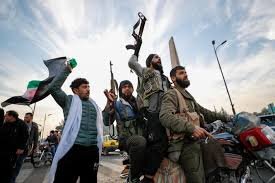INSUBCONTINENT EXCLUSIVE:
TEHRAN - In a commentary published on Dec
stance on this issue alone pose a major obstacle to establishing a consensus-based order
the defeat of militant groups and the preservation of the sovereignty of these two Arab countries.However, at the same time, Assad's
government had no alignment with democracy, and western and Arab leaders were fearful and angry about the extensive presence
In any case, the overthrow of the Syrian political system has created a major shift in the region's geopolitics.In the short term, Iran,
Russia, Iraq and the Axis of Resistance will be the main losers from Assad's downfall.The collapse of the Assad government will be a
Iraq's security, both in terms of the Kurdish region and from the aspirations of extremist groups for Sunni-majority areas in the country,
the axis in the entire region.However, the activities of new Islamist armed groups at its borders, the rise of Islamist movements and the
potential impact on Syria's future stance on the Palestinian issue and the occupied Golan Heights could increase long-term national
collapse of Syria's secular government and the rise of Islamists will impact the US's long-term interests, with the differing
of increasing instability in the region.Turkey is the main winner
Ankara may hope to resolve the Syrian refugee crisis in Turkey, exert more effective control over the Kurds and strengthen its role in the
Palestinian issue, as well as cement alliances with like-minded groups in the region.While Arab countries are also pleased with the
of which have an affiliation with the Muslim Brotherhood.Several Arab countries, such as Egypt, Saudi Arabia, the UAE and Jordan,
threat by some Arab countries.Regarding the political future of Syria, two scenarios can be imagined: a peaceful transition to a new system;
or a Libyan and Sudanese-style outcome.A peaceful transition could be achieved if the opposition continues with its moderate rhetoric and
However, it is composed of diverse and fragmented groups that have united solely to eliminate a common enemy.Once this shared enemy is
removed and the process of shaping the future begins, their differences will surface, and it remains uncertain how reconcilable these
differences will be.Even if there are no internal disagreements among the opposition, their conflicts with the Kurds and Turkey's stance
on this issue alone pose a major obstacle to establishing a consensus-based order
This could keep Syria in a prolonged political and security crisis, similar to Libya and Sudan.Another important factor is the conflicting
interests of the many external actors, who will each try to increase their influence over Syria's situation in various ways.In any
scenario, future developments in Syria will have a significant impact on the region's geopolitics
Therefore, finding a solution that is acceptable to both regional and global powers is crucial.In April 2017, at the Carnegie Conference in
Preserving Syria's territorial integrity and sovereignty; 5) Preventing the collapse of the Syrian army and security institutions; 6)
Forming an inclusive government in Syria; 7) Building a new Syria based on the will and vote of the majority of the Syrian nation; 8)
Ensuring the protection of minorities in Syria; 9) Holding free elections under the supervision of the United Nations regarding the new
government and constitution of Syria; 10) A comprehensive package of economic aid for Syria's reconstruction, the return of refugees, and
other humanitarian issues.Although there was no receptive ear for these ideas at that time, today, these 10 principles could still be a
comprehensive and sustainable package to resolve the Syrian crisis.

